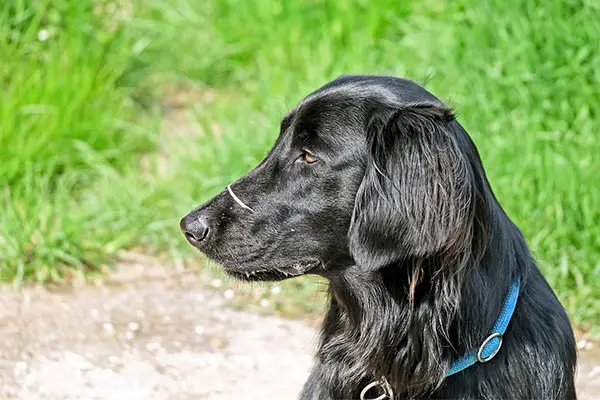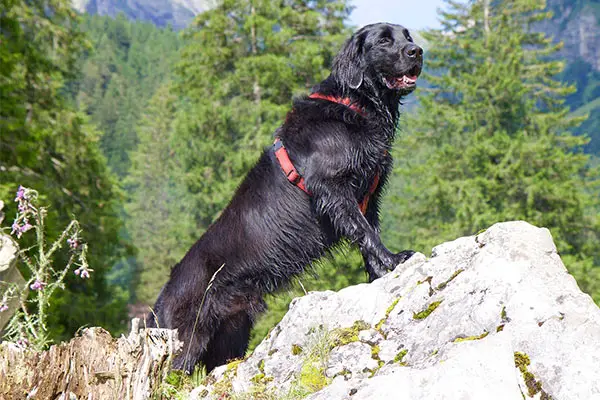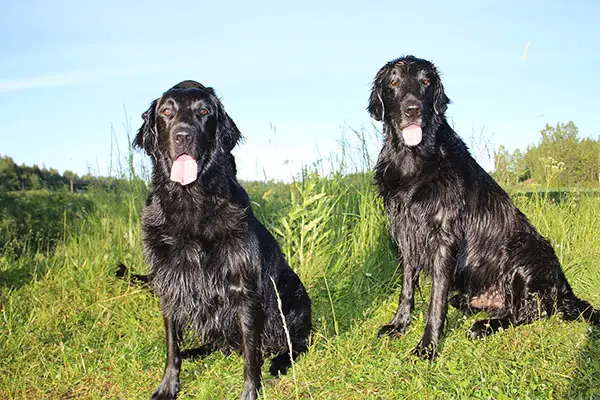Flat-coated Retrievers are large-sized dogs that look like a Golden Retriever, but only in black or liver-colored coats. Their long heads, which are unique among retriever dogs, give them a kind expression that anyone who sees them will surely love them.
Their feathery tail wags consistently, earning them the title of champion tail-waggers. Flat-Coats are generally playful, and they are dogs for those that have the time to entertain them. They are not dogs for everyone, but if you happen to be an excellent fit for these dogs’ personalities, they are affectionate companions.

Flat-Coated Retriever Breed Statistics
| Dog Breed Group | Sporting |
| Breed Size | Large |
| Height | 23-24.5 inches (male); 22-23.5 inches (female) |
| Weight | 60-70 pounds |
| Lifespan | 8-10 years |
Flat-Coated Retriever Breed Ratings
| Energy level | |
| Exercise needs | |
| Requires attention | |
| Playfulness | |
| Trainability | |
| Shedding | |
| Grooming | |
| Friendly with family | |
| Friendly with kids | |
| Friendly with strangers | |
| Friendly with other dogs | |
| Prey Drive |
Flat-Coated Retriever History
Flat-Coated Retrievers were first bred in the mid-1800s in England. Like any other retrieving breeds, Flat Coats were developed to help hunters retrieve birds that fall to the ground. St. John’s water dogs, water spaniels, and some collies are believed to have been used to develop them.
They were said to be Britain’s most popular retrievers before Labradors, and Golden Retrievers became popular. Other than that, they were also called the “Gamekeeper’s Dog,” as they also used to guard estates.
After the first World War, the number of Flat-Coated Retrievers declined drastically, mainly because Labradors and Golden Retrievers became more popular. They almost went into extinction.
Fortunately, fanciers of the breed made a step to bring them back by the mid-1960s. They never gained back their popularity, but the Flat-Coats are still known to be a multi-talented dog. They compete in dog shows and even hold titles in hunting competitions.
They now rank 91st as the most popular dog breed in the US today. They are very affectionate family dogs whose puppy personalities seem to stay forever.
Flat-Coated Retriever Temperament
Flat-Coated Retrievers are generally cheerful, optimistic, and humorous dogs. These dogs have a strong desire to please you, and his wagging tail is proof of how happy he always is.
Matched with his outgoing and confident personality is his athletic and cheerful behavior. Flat-Coats are not couch potatoes, but they can be great cuddle companions after a long tiring day.
They thrive on personal attention. It would help if you didn’t leave them alone in the house without any companion like dogs or other pets. Boredom will trigger destructive behavior like chewing, digging, and messing up your place.
Known to be good with almost everyone, these dogs will not make excellent guard dogs. They are known to be good with children, but supervision is needed when you let them play with toddlers or smaller pets.
Socialization will help these dogs become more well-rounded and confident. Leadership should also be firm and confident when you’re training them.
Flat-Coats can be sensitive to harsh training, and this may make him more stubborn and will refuse to do what you ask. Shower him with praises and other positive reinforcements.
Flat-Coated Retriever Care Requirements
- Nutrition: Flat-Coated Retrievers are active dogs that need a high-quality and well-balanced meal. They don’t have any special dietary requirements, but it’s best to ensure that they get all the nutrients they need. Protein is the most crucial part of your dog’s diet. It should comprise about 20% of your dog’s meal, and less as your dog grows older. The next nutrient that you need to pay attention to is fat, which is essential to keep the hair healthy. And finally, carbohydrates will provide him the energy he needs. If you’re serving him a home-cooked meal, make sure to buy only high-quality ingredients that contain these nutrients. Don’t forget to add fruits and vegetables as sources of fiber and vitamins. For those who prefer dog food, make sure to choose the premium quality ones. These don’t contain fillers and additives that can affect your dog’s digestion. If your dog has any allergies, make sure to take note of those and stay away from dog food containing such ingredients.
- Grooming: Flat-Coated Retrievers have moderate length coats that shed regularly. This means that his coat must also be brushed regularly. Weekly brushing would help remove any loose hair and dirt, but if you can brush his coat daily, the better. Daily brushing would also help form a great bond between you and your dog. Baths can be given occasionally since these dogs don’t have a bad odor. However, make sure to check and clean his ears regularly to prevent ear infection. Nails should be trimmed and kept short as well so as not to cause pain and discomfort to your dogs.
- Exercise: Flat-Coats are known to be highly energetic dogs who love play. They need lots of activities that will exercise their mental and physical well-being. Daily walks and play sessions with you should usually suffice. You can also have them participate in canine sports where they can showcase their skills on tracking, agility, rally, and obedience. The training for these skills will also be a perfect bonding for both of you.
- Health: Like many other retriever breeds, Flat-Coats are also prone to several health conditions. The sooner you learn about these, the better you might be able to prevent it and even prolong their lifespan. Bone diseases such as hip dysplasia and patellar luxation should be something to watch out. It’s best if you keep exercise to enough level, not too strenuous or too light, to keep their bones healthy. A more serious condition to watch out for is cancer, such as malignant histiocytosis, lymphosarcoma, hemangiosarcoma, and osteosarcoma. These are all genetically transferred, so it’s best to meet one of your dog’s parents to see if there’s a possibility your dog will inherit this disease. You should also be careful of what you feed a Flat-Coat as they are prone to gastric torsion or bloating. If you notice any changes in your dog’s behavior, be sure to take him to the vet. Screening tests may also be available to other diseases, so it’s best if your dog takes one.
- Lifespan: The life expectancy of Flat-Coated Retrievers is 8-10 years.
Famous Flat-Coated Retrievers
- Blarney: A four-year-old Flat-Coated Retriever owned by H. Reginald Cooke; won as champion in the hunting/field tests multiple times
- Far and Flyg: Flat-Coated Retrievers who won the 2007 Gundog Group in Crufts
- Shargleam Blackcap: Another Flat-Coated Retriever who won the 1980 Cruft competition
Fun Facts about Flat-Coated Retrievers
- Flat-Coated Retrievers originated in Great Britain.
- They are one of the oldest retriever breeds.
- Before the Labs and Golden Retrievers became popular, Flat-Coated Retrievers were the top dogs in retrieving and gamekeeping.
- Their coat should only be in two colors – solid black or solid liver.
- They almost became extinct after the First World War.
- They are the poorest guard dogs among all dog breeds.
- They are slow to mature.
Check Out Other Sporting Dog Breeds:
American Water Spaniel, Boykin Spaniel, Brittany, Chesapeake Bay Retriever, Clumber Spaniel, Cocker Spaniel, Curly-Coated Retriever, English Cocker Spaniel, English Setter, English Springer Spaniel, Field Spaniel, German Shorthaired Pointer, German Wirehaired Pointer, Golden Retriever, Gordon Setter, Irish Red and White Setter, Irish Setter, Irish Water Spaniel, Kooikerhondje, Labrador Retriever, Lagotti Romagnoli, Nova Scotia Duck Tolling Retriever, Pointer, Spinoni Italiani, Sussex Spaniel, Vizsla, Weimaraner, Welsh Springer Spaniel, Wirehaired Pointing Griffon, Wirehaired Vizslas


